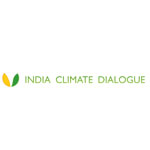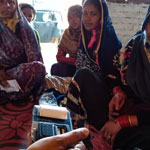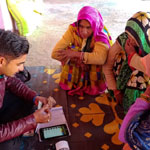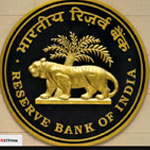-
The Times Bureau | October, 11, 2021
Sankalp Global Summit 2021 will be conducted virtually from October 12 to 14, 2021
Read More -
Economic Times | January, 11, 2021
Good business sense, but poor economics: Commercial EVs trudge along the bumpy road
Read More -
Economic Times | January, 11, 2021
Clubbed in groups, lending models for women-run businesses have a peculiar problem
Read More -
Economic Times | January, 11, 2021
With a commission of Rs 15, RBI’s Business Correspondents model might be failing Government’s financial inclusion plans
Read More -
Economic Times | January, 11, 2021
India’s election system, logistics sector can be the key to effective COVID-19 vaccine distribution
Read More -
Economic Times | January, 11, 2021
Did the Government’s Rs 3 lakh crore collateral-free loan ECLG scheme do enough to prop up the MSME sector?
Read More -
Economic Times | January, 11, 2021
Digital financial services have a problem. It’s called trust deficit
Read More -
The Print | January, 11, 2021
Lives & livelihoods are interdependent, can’t go back to how things were, says WHO chief
Read More

Sankalp Global Summit 2021 will be conducted virtually from October 12 to 14, 2021
India (Maharashtra), October 11: The Sankalp Global Summit 2021, one of the world’s largest inclusive development platforms and an Intellecap initiative, will hold its 13th edition in a virtual format over the next two days.The Summit would draw 2,000+ attendees from 70+ countries, with 200+ Hours of Training, 50+ Sessions, 500+ Consultants, 200+ Investors, and over 100+ Female Founders.Over 200 speakers from around the globe will attend the summit, including two eminent Nobel Laureates, Kailash Satyarthi, Founder, Bachpan Bachao Andolan, and Muhammad Yunus, Founder, Grameen Bank.The discussions will be focused on climate resilience, ecology, circularity, financial inclusion, and sustainable development, according to Ajay Mathur, the Director General of the International Solar Alliance; Arti Ahuja, Additional Secretary, Ministry of Health and Family Welfare, Government of India; Parmesh Shah, Global Lead for Data Driven Digital Agriculture, World Bank; Dr. Srikanya Yathip, CEO, The Hong Kong Capital Development Fund; and Veena Reddy, Mission Director, USAIDIndia The urgency for businesses, departments, governments, and individuals to transition to an impact-driven society has never been more apparent, as demonstrated by our call to action at Sankalp this year, according to Urvashi Devidayal, Sankalp India Lead and Associate Vice President of Intellecap.
We examine the relationship between technology, capital, and women across all of our thématizing areas.The Sankalp Global Summit is at the heart of a celebration of entrepreneurship.The summit will feature deal rooms, a sleepover party, exhibition booths, literary sessions, and the Sankalp Global Awards, where top companies will be recognized.The sessions will be divided into eight high impact areas: agriculture, renewable energy and climate solutions, financial services, health and WASH, gender and livelihoods, impact investing, and blended finance, and the future of work.
The Sankalp Forum was established in India in 2009 by Intellecap, a division of the Aavishkaar Group, to develop a vibrant ecosystem for business-led inclusive growth Sankalp has built one of the world’s biggest impact enterprise-focused websites, covering three continents, that has showcased and found 1800+ entrepreneurs, in 25+ editions, and connected them to 600+ investors.Sankalp has helped businesses and entrepreneurs thrive, receiving over USD 270 million in grants and disbursing over USD 870,000 in cash grants.Governments, Corporations, influential forums like the G8 and G20, media, and civil society are collaborating with Sankalp Forum to drive a paradigm shift in inclusive development theories.Intellecap, a part of the Aavishkaar Group, is a pioneer in creating and nurturing resilient and equitable societies.Intellecap, founded in 2002, works in key sectors such as Agriculture, Livelihoods, Climate Change, Sustainable Energy, Financial Services, Gender & Inclusion, Healthcare, Water and Sanitation, and has completed more than 500 global engagements in 40+ countries.
Sankalp Forum, one of the world’s largest inclusive development forums, brings together the community to shape how markets function for achieving the SDGs 2030.The following organizations are included in Intellecap’s list of clients, which include the United States Department of Agriculture, the Rockefeller Foundation, the World Bank, Ford Foundation, The Hans Foundation, the Doen Foundation, GIZ, DFID, Hindustan Unilever, P&G, International Finance Corporation, and the Michael and Susan Dell Foundation.

Climate risk strategies needed for investors in India
Financial institutions in India will have to integrate climate risk considerations in their investment decisions and portfolio management to mitigate impacts
Financial institutions in India will have to integrate climate risk considerations in their investment decisions and portfolio management to mitigate impacts
India have lost over USD 80 billion in the 20 years to 2019 due to climate change and the losses could only multiply in the coming years, a recent report has said.
Businesses and investors need to be more proactive in incorporating climate risk considerations in their operations , along with the government, which needs to include climate change resilience initiatives in its policies, said the Climate Risk Mainstreaming; Approaches for Indian Financial Institutions report by the Shakti Sustainable Energy Foundation .
“The country has faced intense and increased events of floods, drought, cyclones, erratic rainfall, heat (and) water stress, which has impacted livelihoods, businesses, and thus the portfolio of financial institutions,” the report said. “Hence, it is important for financial institutions to rethink their financing strategies and deploy capital with careful consideration of climate risk mainstreaming strategies.”
The study carried out by Intellecap, a financial advisory, mapped the understanding of financial institutions in India on climate risk mainstreaming requirements as well as implementation strategies.
“As of now, Indian financial institutions do not have a specific strategy to manage risks induced by extreme weather events in their operations and portfolios,” said Santosh Kumar Singh, director, energy, agriculture and climate change, Intellecap. “A majority of financial institutions suggested that it will take another 3-4 years for them to develop and consider climate risk mainstreaming models for their investments.”
For instance, in its annual survey of energy transition in developing countries in Climatescope 2020, BloombergNEF found a 12% decline in clean energy investments in 2018-19 to USD 8.5 billion. The fall was as much as 32% since the peak of USD 12.6 billion in 2017.
Policy action
Realising the gravity of the situation, India’s environment ministry in December announced forming a high-level inter-ministerial Apex Committee for Implementation of Paris Agreement (AIPA).
“The purpose of the AIPA is to generate a coordinated response on climate change matters, which ensures that India is on track to meet its obligations under the Paris Agreement, including its Nationally Determined Contributions (NDCs),” the ministry said in a statement.
“Climate change must be fought not in silos but in an integrated, comprehensive and holistic way,” Prime Minister Narendra Modi said at the summit of G20 nations on November 22. “The entire world can progress faster if there is greater support of technology and finance to developing nations”.
Policy can play in coming up with climate solutions when calamities strike, Singh said. “One of the most critical aspects of managing climate risk is to understand the portfolio exposure to different sectors that are vulnerable to climate hazards and have both physical and transition risks. The next step is to disclose the exposures to these risks to larger stakeholders,” he said. “Once you start understanding and disclosing climate risk, then managing them and mainstreaming them follow.”
In the absence of any government mandate or push from the central bank, financial institutions have not been proactive in reporting exposure to climate risks or their exposure to different sectors that are vulnerable to climate hazards and risks, Singh said.
Mainstreaming climate risks
Government guidelines and regulations can push financial institutions to report their exposure to climate risks and make them act to mainstream climate risks in their portfolios and operations.
Government institutions such as the National Disaster Management Authority (NDMA) need to set up appropriate and dedicated climate collection data mechanisms in the country and make them available to relevant stakeholders. “These will act as inputs to scenario analysis,” Singh said. “Legitimate inputs are essential for accurate predictions and will greatly aid investors to initiate climate action.”
Climate change could cost businesses and investors across the world over USD 1.2 trillion over the next 15 years, the Intellicap report said. The private sector has a role in mitigating this, Singh said.
There has to be efforts to create climate risk indicators and modes of collecting relevant data required for climate risk modelling, which could be provided for consideration of everyone, he said. Insurance companies and credit rating agencies, for instance, could share knowledge and experience in managing climate risk owing to the nature of the business they are involved in, where it is essential to factor all important risks.
In 2015, a private sector led initiative called Climate-related Financial Disclosures (TCFD) was set-up in India to help develop voluntary, consistent climate-related financial risk disclosures for use by companies in providing information to investors, lenders, insurers, and other stakeholders.
TCFD recommendations are intended to help build considerations of the effects of climate change into routine business and financial decisions.
Responsibility and foresight
“Their adoption can help companies demonstrate responsibility and foresight. Also, better disclosure will lead to more informed and more efficient allocation of capital,” Singh said. “Overall, 1,500 organisations globally, including over 1,340 companies with a market capitalisation of USD 12.6 trillion and financial institutions responsible for assets of USD 150 trillion have expressed support for TCFD recommendations.”
Akin to the growth in the number of organisations supporting TCFD, investor demand for companies to report information in line with the TCFD recommendations has also grown dramatically, he said.
As part of Climate Action 100+, more than 500 investors with over USD 47 trillion in assets under management are engaging the world’s largest corporate greenhouse gas emitters to strengthen their climate-related disclosures by implementing the TCFD recommendations.
In addition, many large asset managers and asset owners have asked or encouraged investee companies to report in line with the TCFD recommendations and reflected this in their investment practices or policies.
Along with recommendations, the task force has issued guidance on two topics — conducting climate-related scenario analysis and integrating climate-related risks — into existing risk management processes and disclosing those processes.
Such metrics would help financial institutions understand the process of integrating climate risks along with understanding from other organizations that are part of TCFD recommendations, Singh said.

Good business sense, but poor economics: Commercial EVs trudge along the bumpy road
One of India’s major efforts to curb air pollution in the country has been its dedicated focus on adopting electric mobility. In the last 10 years, the Indian automobile industry has seen a high penetration of electric mobility, especially in the private vehicle sector, including electric cars and scooters. This has been a result of combined efforts of the government and private sector, including startups and existing vehicle manufacturers. On

Clubbed in groups, lending models for women-run businesses have a peculiar problem
Women make up an overwhelming majority of the microfinance borrowers in the country – 85% share – as per a report by SIDBI and PwC India in November 2019, but there is an anomaly.Most of the microfinance players disburse loans either through the Joint Liability Group (JLG) or the Self-Help Group (SHG) model. Individual micro enterprise loans for women entrepreneurs still don’t come by that easy, given a lack of access to traditional collateral

With a commission of Rs 15, RBI’s Business Correspondents model might be failing Government’s financial inclusion plans
India has around 89.5 crore people living in rural areas. The number of ATMs? 5%. According to an RBI data, out of 6 lakh villages in India, less than 30,000 villages have ATMs.To ensure financial inclusion to the last-mile consumers bereft of digital payments or even ATMs at the least, the Reserve Bank of India came up with the Business Correspondents (BC) model in 2006. BCs are retail agents deployed by banks for providing banking services at

India’s election system, logistics sector can be the key to effective COVID-19 vaccine distribution
While the coming of the vaccine is being eagerly awaited as an antidote to the pandemic, infrastructural challenges surrounding last mile delivery have been raising considerable concern. Over 150 nations had earlier joined the global COVAX scheme for fair distribution of future vaccines against COVID-19, an alliance led by WHO said in September.But how can the global community be truly prepared for effective vaccine procurement and distribution?

Did the Government’s Rs 3 lakh crore collateral-free loan ECLG scheme do enough to prop up the MSME sector?
With the sanctioned amount still below the planned target, the Government’s Rs 3-lakh crore collateral-free loan scheme for MSMEs that was to end on October 30, has been extended by one month. But since the scheme was announced in May, we now have greater clarity on its performance and shortcomings. According to the data uploaded by member lending institutions on the Emergency Credit Line Guarantee Scheme (ECLGS) portal, an amount of Rs 2.03

Digital financial services have a problem. It’s called trust deficit
Digital financial services have seen a rapid growth since the demonetisation drive four years ago. Besides this, the Prime Minister’s flagship programme ‘Digital India’ boosted the entry of Fintechs and enablers like Aadhaar, Jan-Dhan, and mobile penetration have helped in large-scale adoption of digital payments. According to the latest NPCI data, the UPI registered 2.07 billion transactions worth Rs 3,86,106 crore in October this year.

Lives & livelihoods are interdependent, can’t go back to how things were, says WHO chief
At a virtual summit, WHO chief Tedros Adhanom Ghebreyesus says focus should remain on helping the vulnerable population and that people must learn to live with social distancing.
Tedros was delivering the keynote address on day three of the Sankalp Global Summit 2020’s ‘Health and Wash Session’.
During his address, Tedros said that while the global conversation is revolving around choosing between lives and livelihoods, the focus should remain on health too.
“The conversation around the world is between lives and livelihoods. But there is no such choice as the two are not independent, but interdependent. When people are healthy, only then can they innovate,” he said.
The virtual summit, which started on 2 November, will continue until 6 November. The summit has over 5,000 delegates from India and over 30 countries are participating. The focus of the summit is ‘An Entrepreneurial Renaissance — Designing An Impact Economy’.
Focus on vulnerable groups
The WHO chief, who is in self-isolation after one of his contacts tested positive, said the focus should remain on helping the vulnerable population.
He said people should find ways to help each other during the pandemic, and for this, he listed a few ways. This includes finding a way to contribute to community response, staying informed about the facts and best practices of hygiene and social distancing, and advocating for more preparedness in health so that if such a pandemic strikes again, healthcare systems are better prepared.
In addition, workplaces should also set examples of safety measures and plan how to handle a similar crisis in the future if a pandemic strikes again, Tedros added.
The summit comes at a time when the US and the UK, as well as parts of Europe are witnessing a second wave of coronavirus infections.
India, however, registered a decline in cases over the last week.
According to the health ministry, as of Wednesday, India has recorded a total of 83,13,876 cases with 1,23,611 deaths and 76,56,478 recoveries.
The global tally according to the WHO dashboard stands at 47,059,867 total cases with 12,07,327 deaths.
‘Must learn to live with social distancing’
At the summit, Tedros said focus should remain on taking care of mental health along with physical health. “There is no health without mental health,” he said.
The WHO chief further said in order for the community to tide over the pandemic, people must learn to live with social distancing.
“We can’t go back to the way things were,” he added.
Why news media is in crisis & How you can fix it
India needs free, fair, non-hyphenated and questioning journalism even more as it faces multiple crises.
But the news media is in a crisis of its own. There have been brutal layoffs and pay-cuts. The best of journalism is shrinking, yielding to crude prime-time spectacle.
ThePrint has the finest young reporters, columnists and editors working for it. Sustaining journalism of this quality needs smart and thinking people like you to pay for it. Whether you live in India or overseas, you can do it here.

Sankalp Global Summit 2020
Sankalp was initiated in India in 2009 by Intellecap to create a thriving ecosystem for business-led solutions to achieve the UN SDG Sustainable Development Goals by 2030 across the Global South.
Over the past 11 years, Sankalp has built one of the world’s largest impact enterprise focused platforms that has showcased and discovered 1,800+ entrepreneurs through 22 editions of its flagship summits and has connected them to over 600 investors. Sankalp has enabled entrepreneurs to raise over USD 270 million in funding and disbursed $870 K in cash grants.
Sankalp also engages with governments, corporations, influential platforms like the G7 and G20, media and civil society to drive a paradigm shift in inclusive development approaches. Sankalp’s core is the entrepreneur and it uses the framework of knowledge, capital & networks to create an enabling ecosystem for their success.
Location: Virtual
Dates: November 2, 2020 – November 6, 2020
Reports & Policies
Our Impact Map

Sign up for our newsletter
© Copyright 2018 Intellecap Advisory Services Pvt. Ltd. - All Rights Reserved




